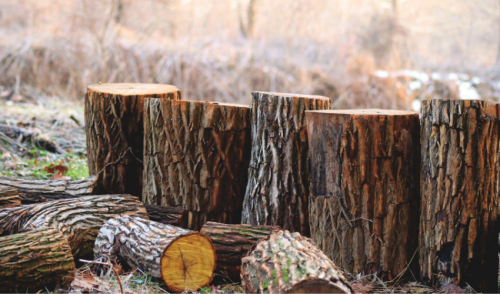{article.name}
How to Use a Stump Grinder

- Share this:
- Share on Facebook
- Pin on Pinterest
- Tweet on Twitter
Stumps can be a hassle in the landscape, but a stump grinder is an easy solution to remove the obstacle without needing to dig, chop, or pry through extensive root systems to eliminate the stump. But is a stump grinder right for your job, and how can you use it safely and efficiently?
About Stump Grinders
Stump grinders are specialized power tools with strong grinding blades to chew, chip, and mulch tree stumps right in the ground, with no need to dig the stump up first. There are different sizes of stump grinders available, from slimline models that are lighter and easier to maneuver into tight or awkward spaces, to larger, more industrial models that can handle larger, more obstinate stumps.
Using a stump grinder can be a great alternative to digging up stumps. Because root balls can be significantly larger than a mature tree, digging up a stump can be a tremendous undertaking and may leave large, unsightly holes in the landscape. A stump grinder, however, can eliminate the above ground portion of the stump and leave a relatively smooth surface ready for planting. Unless you plan to plant another large tree in the same spot, this can be a great choice for you – large trees, however, will require more clear soil without the leftover roots after a stump grinder has been used.
There is some small risk that a plant may regrow from a leftover root system after the stump has been ground away, depending on the type of tree, soil conditions, and how robust the roots may be. For most projects, however, a stump grinder can be a great solution to the problems stumps cause.
Using a Stump Grinder
Stump grinders can be large, heavy, and awkward, making them very intimidating to use. They can be easier to handle than most people realize, however, and rental companies should provide safe, comfortable instruction for how to properly use the equipment before you rent it. They can also help you choose the proper size and model of stump grinder for the stumps you have to eliminate. When you’re ready to get grinding…
- Call Utility Companies First Call your local utility companies prior to doing any work with a stump grinder to be sure you aren’t accidentally endangering underground cables, gas lines, or power lines. Not only can such damage be inconvenient and expensive to repair, but it can cause tremendous injuries and damage the stump grinder. In many areas, it is illegal to start any digging work, including grinding stumps, without first making the appropriate calls or getting a free property survey.
- Read the Operating Manual Read all instructions for the proper use of the stump grinder, even if you did get some instruction or a brief demonstration when you arranged the tool rental. Always use the equipment properly, staying behind the control panel while the grinder is in operation so you are nowhere near its sharp teeth and blades.
- Wear Appropriate Safety Gear Stump grinders can be very loud and may throw out sharp bits of wood or small rocks as they get deeper into the ground. Always wear hearing protection such as ear plugs or earmuffs to muffle the machine’s roar, and wear safety goggles to protect your eyes from excess dust and flying debris. Padded gloves can also make your hands more comfortable despite the machine’s harsh vibrations.
- Cut the Tree to Ground Level If your stump is several inches above the ground, it is best to use a chainsaw, ax, hatchet, or other tools to remove the top portion of the stump as close to the ground as possible before engaging the stump grinder. This will make the grinder do less work, so the blades remain sharper and the task can be finished more quickly.
- Clear the Nearby Area Rocks or gravel near the stump can become dangerous projectiles that will be flung by the stump grinder, so it is important to clear them away from the stump before starting to grind. Use a mattock, shovel, or trowel to bare the sides of the stump and clear out any unwanted debris before beginning. This will also better reveal the scope of the stump so you can be sure to grind it al away.
- Sharpen the Grinder’s Teeth The stump grinder will work best if its teeth are sharp. Check that there is no debris on the equipment, and sharpen the blades if necessary. If you’ve rented the equipment, this sharpening should already be done before you pick up the grinder or have it delivered.
- Grind From One Edge to the Other Start on one edge of the stump, using the grinder’s hydraulic lever to raise and lower the toothed surface to contact the stump. Use smooth sweeping motions from side to side across the surface of the stump, but do not force the grinder if it is resisting. Instead, back off and try again, without lowering the grinder quite as far. Gradually you will be able to move across the stump several times, moving deeper and deeper to eliminate the stump completely.
- Smooth the Mound Once you have ground 4-8 inches below the surface, you’ve ground enough and the stump is gone. Smooth the remaining dirt over the bare patch, removing any excess mulch or wood chips. You may want to add fertilizer to the area or otherwise prep the soil before planting sod, grass seed, or flowers in the patch.
- Reuse the Mulch Mulch from grinding stumps is ideal to use in landscaping beds or garden rows, or it can be added to a compost pile if preferred. If you have too much for your own use, consider donating the leftover mulch to a community garden, your neighbors, or anywhere else it can be used.
A stump can be an unsightly eyesore and an inconvenient obstacle in the yard, but by learning how to use a stump grinder, you can quickly remove these problems and enjoy a stump-free yard.
© 2026 Westville Grand Rental Station. All rights reserved.
Serving Southern NH and The Merrimack Valley Since 1990
View our accessibility statement
Driven by New Media Retailer

Comments